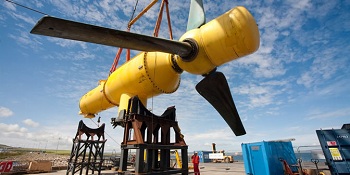French dive into tidal energy as nuclear plants bid adieu
 French conglomerate Alstom is finalizing the purchase of Tidal Generation Ltd from Rolls Royce in the UK. Alstom, one of the largest energy-producing groups in the world, purchased the small company in an effort to expand its every-growing array of renewable energy. The sale of TGL to Alstom comes just as the new French president, Francois Hollande, announced his commitment to renewable energy and decreasing France’s dependence on nuclear power.
French conglomerate Alstom is finalizing the purchase of Tidal Generation Ltd from Rolls Royce in the UK. Alstom, one of the largest energy-producing groups in the world, purchased the small company in an effort to expand its every-growing array of renewable energy. The sale of TGL to Alstom comes just as the new French president, Francois Hollande, announced his commitment to renewable energy and decreasing France’s dependence on nuclear power.Tidal Generation Ltd (TGL), formed in 2005, specializes in designing turbines for generating electricity from ocean tides. The process is nothing novel, dating back to Roman times, but exploiting the tides on a large scale has proved difficult throughout recent years. High costs and ecological concerns have prevented large companies from investing too much in underwater turbines.
TGL is trying to change all of that. In 2009, the start-up, employing 29 individuals, was purchased by Rolls Royce Plc, the branch of the famed automaker that broke away in 1973. In Scotland currently, TGL implemented a generator in 2010 that has been producing energy to a grid for 300 homes.
By purchasing TGL, Alstom adds another feather in its cap of renewable energy including other sources of water, wind, geothermal, and solar power. The new acquisition will add to the technology and ongoing development at Alstom’s French research center in Nantes, located just south of the world’s first and second largest tidal power station in Rance on the English Channel, opened in 1966.
The purchase, however, can be interpreted as a strategic one. In addition to renewable sources of energy, Alstom technology makes up 30% of the world’s nuclear energy, something that the French are very keen to reduce. With 58 reactors, making it the most nuclear-dependent country in the world, France will soon see a decrease in nuclear energy if the new president has his way.
President Hollande made clear his environmental program, heavily influenced by the Green Party, two weeks ago. He plans to shut down the oldest reactor in France and to reduce nuclear energy from over 75% to 50% with the closing of 24 reactors by 2025. Could Alstom be preparing for dwindling demand of nuclear energy in favor of more eco-friendly renewable sources of energy?
According to Jerome Pecresse, Alstom Renewable Sector President, French policies aren’t the only driving force behind Alstom’s projects. Even though Alstom is a huge presence in the nuclear sector, Pecresse said he’s not overly concerned with the French president’s energy plans. While the French are looking to reduce nuclear power, other nations are still looking to harness it, even after the disaster in Japan. “France is just 20 percent of our business, we have a more global and international vision of the market,” he said.
The purchase of TGL was more a practical decision than anything else. “We think they have some of the most advanced technology on the market,” Pecresse told SmartPlanet.
Alstom’s technology can be found all over the world, recently signing a contract to provide wind turbines in Brazil and working to modernize coal and wind-powered generators in Australia. Their projects are unfolding in Korea, Russia, and across Latin America, an area that Pecresse said is where a large demand for renewable energy is keeping Alstom busy providing their services.
It remains to be seen how France, and the rest of the EU for that matter, will continue to pursue renewable sources of energy. Wind energy production in Europe, for example, just reached the 100 gigawatt mark, the equivalent of 39 nuclear power plants, according to Reuters. Still, political turmoil and certainty in across EU member nations leave the future of these initiatives up in the air.
You can return to the main Market News page, or press the Back button on your browser.

